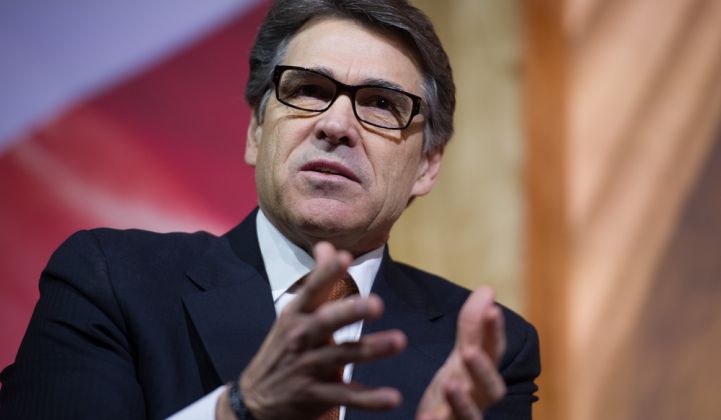UPDATE: E&E News reported on Monday that languge blaming natural gas and low electricity demand for triggering baseload power plant closures has been removed from the latest version of the DOE report.
A draft version of the Department of Energy's highly anticipated grid study states that wind and solar do not represent a serious threat to electric grid reliability, running counter to comments made by Energy Secretary Rick Perry earlier this year.
"Costly environmental regulations and subsidized renewable generation have exacerbated baseload power plant retirements," according to a draft obtained by Bloomberg. "However, those factors played minor roles compared to the longstanding drop in electricity demand relative to previous expectations and years of low electric prices driven by high natural gas availability."
Perry ordered the grid study in April to examine if Obama-era clean energy incentives were responsible for undermining baseload resources such as nuclear and coal, thereby making the grid less secure. He went as far as to suggest that the U.S. federal government may need to interfere in state-level policymaking in the name of national security.
"Are there issues that are so important to the national security of this country that the federal government can intervene on the regulatory side? I’ll suggest there are," he said, while speaking at conference in May. "Being able to have and make sure we’re able to maintain a baseload on our grid is of national security."
Perry's study order does not specifically list wind and solar as a reliability threat, but it does state that policies designed by previous administrations to "decrease coal-fired power generation" have "destroyed jobs and economic growth, and they threaten to undercut the performance of the grid well into the future." It also states that grid experts have "expressed concerns about the erosion of critical baseload resources."
Clean energy advocates feared the 60-day study, which did not include a public comment period, would conclude that renewables and their supporting policies were wreaking havoc on the grid, before experts could conduct a full and fair review. Industry and analysis groups including the American Wind Energy Association, Advanced Energy Economy, the Union of Concerned Scientists and The Brattle Group have submitted numerous resources to the DOE in recent weeks, in hopes of informing the outcome.
President Trump has said repeatedly that he intends to undo Obama's energy agenda and revive the U.S. coal industry. Critics feared the administration would use the study to justify slowing the growth of wind and solar in order to support struggling coal plants.
The leaked draft concludes that the electric grid is more reliable today due to better planning -- a point that's been made by proponents of a more diverse energy mix. "Grid operators are using technologies, standards and practices to assure that they can continue operating the grid reliably," the draft states.
A separate, six-page draft outline from May found that energy efficiency, battery storage and demand response were helping to improve the reliability of the grid.
These excerpts on renewables and reliability may not make it into the final version of the study, however.
"Those statements as written are not in the current draft," Energy Department spokesperson Shaylyn Hynes told Bloomberg. She declined to say the statements are incorrect, noting that draft is "constantly evolving."
It's customary for career officials to draft a report and send it to administration officials for approval. During this process, conclusions are subject to change.
"The leaked draft study is right to identify stagnant load and low natural gas prices as the proximate causes of baseload's woes in the United States, rather than environmental regulations and renewable energy incentives," said Shayle Kann, vice president of GTM Research.
Language in the leaked text, such as the phrase "costly environmental regulations," seems unlikely to have been written by a pro-renewable energy dissident within DOE, Kann said. "However, a DOE spokesperson has already noted that 'those statements are not in the current draft,' so we'll need to await the final study...to see if its conclusions differ."
The study is currently slated to be released next week.



